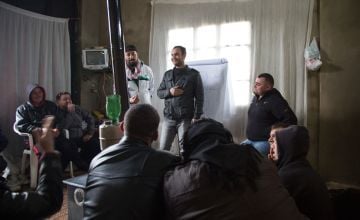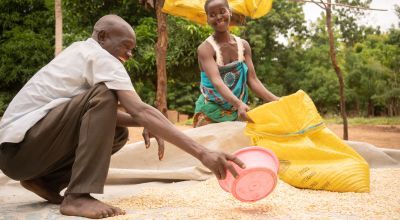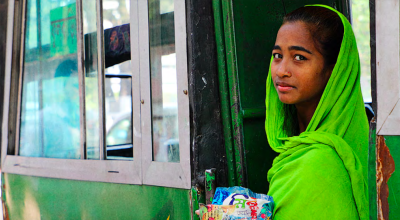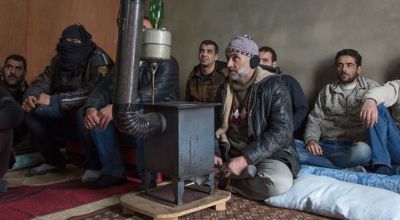
Read our 2024 annual report

Knowledge Hub
Gender equality is important because we won't end extreme poverty without it. From gender-based violence to the gender pay gap, policies (or lack thereof) prevent women from enjoying the same basic human rights and dignity as their male counterparts.
The knock-on effects of gender inequalities can be extensive. They can further broaden equity gaps based on other forms of marginalisation, such as ethnicity, class, religion, or migrant status. When women don’t have the same rights as men, they’re less likely to participate in their local economies, receive an education, be involved with local and national politics, get the healthcare access they need and deserve, or engage with the justice system when needed.
Much of Concern’s work focuses on women and girls, yet recent studies have shown that programmes working to end poverty often see limited results when focusing just on women and girls. In some cases, it can even reverse progress.
As Rob Base and DJ EZ Rock once put it, it takes two to make a thing go right.
Why we need to engage male allies for gender equality
A growing body of evidence has affirmed that engaging men is key to achieving gender equality. From perpetrating gender-based violence (GBV) to avoiding domestic work and caregiving duties, men’s behaviours are influenced by social norms. These norms are also shaped around traditional views of masculinity.
Yet, men play an essential role in challenging the patriarchal beliefs and practices that promote the subordination of women. However, in many of the areas where Concern works, questioning these gender norms can be risky for men as well as women.
In a crisis, men who grew up within these structures may feel added pressure. For instance, as the Syrian crisis led to a mass exodus of refugees, many men were no longer able to support their families and felt pressure to remain tough under high-stress circumstances. This led to some husbands and fathers lashing out on their wives and children in ways that they’d never done before.

How we’re engaging male allies
“Engaging Men and Boys” is one of Concern’s core gender equality programmes, based in part on the experience and expertise of organisations including Promundo, Men’s Resources International, and Sonke Gender Justice. Participants are able to test and practise their new skills as male allies within the safe environment of the group, as well as at home with their partner and children. Each programme follows a schedule of eight to fifteen sessions, where groups regularly meet and reflect on how the processes and skills they are learning can translate into real life. Some meetings are separated by gender, others bring men and women together.
We break this programme down into four modules. Since Concern staff members and partners also undergo this training, the third and fourth modules are more geared towards their work — although there are elements that can be used by the people we work with in creating their own community groups and accountability systems.
"This training has made me a changed person in terms of resolving conflict in my home and in the homes of my extended families."
Module 1: Gender Transformation
Here, we introduce gender equality and why it’s important, working with both men and women to understand the differences between sex and gender (as well as the idea of sex beyond the binaries of men and women) and, within that, how gender roles shape people’s lives. We look at this through a lens of power; how power is used, abused, and linked to certain privileges, rights, and resources.
We ask men and boys to consider how they are socialised into gender roles based on their biological sex, reflect on the power that different individuals and groups have, and how they may embark on a process of transformation towards gender equality through their personal and intimate relationships.
Module 2: Enabling Change
Having gained a deeper understanding about gender issues and gender equality in Module One, our second module moves from understanding to action. We strengthen the capacity of participants to “make the change,” encouraging participants to look at their own attitudes and behaviour (particularly as men) and embark on personal actions to put change into practice.
Part of this practice lies in men taking what they have learned about gender transformation and applying it to their relationship with their partner, family, and friends — people who have not been through the same process of considering (and changing!) their own values, attitudes, and behaviour towards gender roles and norms.
“I used to be very dictatorial in my home but with this training, I now listen to the views of my partner.”
Module 3: Facilitating the Change
Having started to transform their own personal gender attitudes, behaviours, and values, participants are in a better position to pass on their knowledge and understanding to others. In this module, we work with participants to equip them with the necessary skills they can use to share what they’ve learned with others. When Concern staff members and partners go through this training, they also learn how to assess the gender-sensitivity of their own programmes and make plans to enhance gender equality.
Module 4: Community Action
Our final module builds on the content of the other modules to take what has been learned into the community. Participants in Engaging Men and Boys can manage their own awareness-raising activities or action teams to help promote active citizenship and accountability within their communities.

Working together to make a thing go right
One of the key elements of Engaging Men and Boys is to help them become better listeners to the women and girls in their lives. Because men are often used to being in control in communities, even if women feel safe expressing their concerns and complaints, the natural inclination is for men to take over the conversation and tell women what needs to happen next. This is why many discussions do not actually end up improving the lives of women and girls (much in the same way that development and humanitarian organisations need to listen to communities first, rather than going in and applying programming that may not do much for their actual needs).
The best way men can support women is by asking the women in their lives how they can be most helpful to them; rather than making the decision themselves about what they want or don’t want to help. When men listen to women and care about their safety, they are holding themselves accountable to women and girls. They show that they understand that many men harm women — either actively or with smaller microaggressions — and that they’re trying to do better. They understand that they have a responsibility to end gender inequality and violence against women and girls.
When both men and women listen to each other and they both care about each other’s safety, they are holding themselves accountable to each other. This has its own knock-on effect, one for good, as it benefits their family, children, and communities. The first step to creating a better world for women and girls is by listening to what women and girls have to say, and recognising that we all have a responsibility for making the world a safer and fairer place.
”We started to realize that a lot of roles in the home can be done by anybody. By sharing these we can see the changes on the welfare of the family, how women are treated.”
How you can be a better ally for gender equality
The core concepts of Engaging Men and Boys hold up no matter your country or context! Here are six ways you can be a better male ally for gender equality, based on our Engaging Men trainings:
- Listen to women and ensure that their voices, perspectives, and needs are being heard
- Reflect on your own power as a man in your society and community
- Consider the stereotypes that are applied to both men and women in your culture — which are harmful?
- Challenge others when you see them play into these harmful stereotypes or use sexist language; focus on educating (“calling in”) versus punishing (“calling out”)
- Find other nonviolent ways to be an active bystander if you see a woman being harassed in public (more information on that can be found at breakingthesilence.cam.uk)
- Help your spouse or partner with the unpaid domestic labour at home (such as cooking and cleaning) that traditionally fall to women




